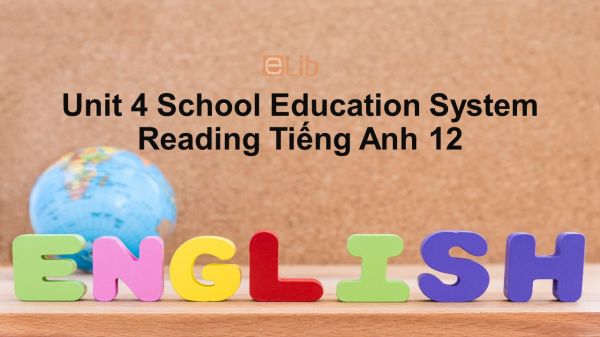Unit 4 lớp 12: School Education System-Reading
Bài học Unit 4 Lớp 12 School Education System phần Reading cung cấp thông tin về hệ thống giáo dục ở Anh quốc. Thông qua bài học, các em được rèn luyện kỹ năng đoán nghĩa từ qua ngữ cảnh và kỹ năng đọc để nắm thông tin chi tiết của bài.
Mục lục nội dung

1. Before You Read Unit 4 lớp 12

Read the facts below and decide whether the statements are true (T) or false (F). Then compare your results with your partner’s (Đọc những sự kiện dưới đây và sau đó quyết định những câu nói đúng (T) hay sai (F), sau đó so sánh kết quả của em với kết quả của bạn cùng học)
Facts about schools (Sự thật về trường học)
1. Children start Grade 1 when they are 6 years old. (Trẻ em bắt đầu lớp 1 khi các em 6 tuổi.)
True
2. Schooling is compulsory from the age of 6 to 16. (Việc đi học bắt buộc từ 6 đến 16 tuổi.)
False (because it is from 6 - 15 (grade 1 to grade 9)
3. The school year generally begins in September and ends in late May. (Năm học thường bắt đầu vào tháng Chín và kết thúc vào cuối tháng Năm.)
True
4. The students do not have any examminations when they finish secondary school. (Học sinh không có kỳ thi nào khi học xong trung học.)
False (They must take the Intermediate Graduation Examination (IGE) - kì thi cuối cấp 2)
5. A school year consists of two terms. (Một năm học bao gồm hai học kỳ.)
True
2. While You Read Unit 4 lớp 12
Read the passage and do the tasks that follow (Đọc đoạn văn và làm bài tập kèm theo)
Schooling is compulsory for all English children from the age of 5 to 16. The academic year in England runs from September to July and is divided into 3 terms. Autumn Term is from the beginning of September to mid-December. Spring Term is from the beginning of January to mid-March and Summer Term from early April to mid-July. Each term is separated by a one-week break called half term, usually at the end of October, mid-February and the end of May.
There are two parallel school systems in England. The first is the state school system, which is free for all students and paid for by the state. The second category is the ‘independent’ or ‘public’ school system, which is fee-paying. The state school system, which educates 93% of the pupils in England, can be divided into two levels of education: primary education and secondary education.
See the Table below for more information about the school education system in England.
The National Curriculum is set by the government and must be followed in all state schools. It is made up of the following subjects: English, Design & Technology, Geography, Maths, Information Technology, Music, Science, Arts, Physical Education, History, and a Modern Foreign Language. English, Maths and Science are core subjects, which are compulsory in the national examinations at certain stages of the school education system.
Tạm dịch
Việc học ở trường là bắt buộc đối với tất cả trẻ em ở Anh từ 5 đến 16 tuổi. Năm học ở Anh kéo dài từ tháng Chín đến tháng Bảy và được chia làm ba học kì. Học kì mùa thu từ đầu tháng Chín đến giữa tháng 12. Học kì mùa Xuân từ đầu tháng Giêng đến giữa tháng Ba và Học kì mùa Hạ từ đầu tháng Tư đến giữa tháng Bảy. Mỗi học kì được chia bởi kì nghỉ một tuần gọi là giữa học kì, thường thường vào cuối tháng Mười, giữa tháng Hai và cuối tháng Năm.
Ở Anh có hai hệ thống trường song song nhau. Hệ thống thứ nhất là hệ thống trường công (nhà nước), miễn phí cho tất cả trẻ con và được nhà nước trả lương. Hệ thống thứ hai là hệ thống nhà trường “độc lập” hay “công cộng”, phải trả tiền. Hệ thống trường công, giáo dục 93% học sinh nước Anh, có thể được chia làm hai trình độ (cấp) giáo dục: giáo dục tiểu học và giáo dục trung học.
Xem bản bên dưới để thêm thông tin về hệ thống giáo dục nhà trường ở Anh.
Chương trình học quốc gia do chính phủ thiết lập và phải được tuân theo ở tất cả trường công. Nó được xây dựng với những môn học sau : tiếng Anh, Thiết kế & Kĩ thuật, Địa lí, Toán, Kĩ thuật thông tin, Nhạc, Khoa học, Hội họa, Thể dục, Lịch sử và một ngoại ngữ hiện đại. Tiếng Anh, Toán và Khoa học là những môn học chính, những môn bắt buộc ở các kì thi quốc gia ở giai đoạn đặc biệt của hệ thống giáo dục nhà trường.
2.1. Task 1 Unit 4 lớp 12
Find words or phrases in the reading passage which have the same following meanings (Tìm những từ hoặc cụm từ trong bài đọc có cùng những nghĩa sau)
1. Schools in which all children can attend without paying tuition fees
⇒ state school
Tạm dịch
Các trường trong đó tất cả trẻ em có thể tham dự mà không phải trả học phí ⟹ trường công lập
2. A stage of study for children aged from 5 to 10.
⇒ primary education
Tạm dịch
Một giai đoạn nghiên cứu cho trẻ em từ 5 đến 10 tuổi ⟹ giáo dục tiểu học
3. A stage of study for children aged from 11 to 16.
⇒ secondary education
Tạm dịch
Giai đoạn nghiên cứu cho trẻ em từ 11 đến 16 tuổi ⟹ giáo dục trung học
4. Put into force by the law
⇒ compulsory
Tạm dịch
Bị ép buộc bởi pháp luật => bắt buộc
5. The examinations children sit at the end of compulsory education.
⇒ the General Certificate of Secondary Education
Tạm dịch
Kỳ thi mà học sinh tham gia vào cuối chương trình giáo dục bắt buộc ⟹ kỳ thi tốt nghiệp trung học
6. A detailed plan for a course of study offered in a school or college.
⇒ curriculum
Tạm dịch
Một kế hoạch chi tiết cho một khóa học được giảng dạy tại một trường học hoặc cao đẳng ⟹ chương trình giảng dạy
2.2. Task 2 Unit 4 lớp 12
Answer the questions (Trả lời các câu hỏi)
1. When do children in England start their compulsory education at school?
⇒ They reach the age of 5.
Tạm dịch
Khi nào trẻ em ở Anh bắt đầu học bắt buộc ở trường? ⇒ Khi bọn trẻ 5 tuổi.
2. How many terms are there in a school year in England?
⇒ There are three terms.
Tạm dịch Trong năm học có bao nhiêu học kỳ ở Anh? ⇒ Có ba học kỳ.
3. What are the two school systems in England?
⇒ The two school systems in England are the state school system and the "independent" or “ public” school system.
Tạm dịch
Hai hệ thống trường học ở Anh là gì? ⇒ Hai hệ thống trường học ở Anh là hệ thống trường công lập và hệ thống trường dân lập.
4. Do children have to pay fees if they go to “independent” or “public” schools?
⇒ Yes, they do.
Tạm dịch
Trẻ em có phải trả phí nếu đi đến các trường dân lập không? ⇒ Có.
5. How many core subjects are there in the national curriculum?
⇒ There are three core subjects in the national curriculum: English, Maths and Science.
Tạm dịch
Có bao nhiêu môn học chính trong chương trình giảng dạy quốc gia?
⇒ Có ba môn học chính trong chương trình quốc gia: Anh văn, Toán và Khoa học.
6. When can students take the GCSE examination?
⇒ When they finish the secondary schools, they have to take an examination called the General Certificate of Secondary Education. (GCSE)
Tạm dịch
Khi nào học sinh có thể thi GCSE? ⇒ Khi học xong trung học, các em phải tham gia kỳ thi gọi là Thi tốt nghiệp trung học.
3. After You Read Unit 4 lớp 12
Work in groups. Tell the others one of the most difficult school subjects you are studying and what you would like your friends and your teacher to dc to help you learn that subject more effectively (Làm việc từng nhóm. Kể cho các bạn khác một trong những môn học khó nhất ở trường em đang học và những gì em muốn các bạn em và giáo viên của em làm để giúp em học môn đó hữu hiệu hơn)
Guide to answer
A: Is there any subject you find the most difficult?
B: Yes, it's English.
C: What do you find difficult about it?
B: Its pronunciation. Most of my friends do think so.
C: Do you ask your teacher to help you?
B: Why not? But after a lot of practices I still find I cannot pronounce and read the words correctly.
A: Well, from my experience, in order to speak English well and correctly we should be patient and constant. It takes a lot of time and patience. You read a word or a sentence many times until you find it good enough.
C: And you should study with your friends to help one another in speaking. If possible, you can ask your teacher to correct you when you find you‘re not good or not confident in yourself.
A: You will speak more easily and better if you're patient and practise frequently.
Tạm dịch
A: Có môn học nào bạn thấy khó nhất không?
B: Có, đó là tiếng Anh.
C: Bạn thấy điều gì khó khăn về nó?
B: Phát âm của nó. Hầu hết bạn bè của tôi nghĩ như vậy.
C: Bạn có nhờ giáo viên giúp bạn không?
B: Tại sao không? Nhưng sau nhiều lần luyện tập, tôi vẫn thấy mình không thể phát âm và đọc đúng các từ.
A: Theo kinh nghiệm của tôi, để nói được tiếng Anh tốt và chính xác, chúng ta nên kiên nhẫn và liên tục. Phải mất rất nhiều thời gian và sự kiên nhẫn. Bạn đọc một từ hoặc một câu nhiều lần cho đến khi bạn thấy nó đủ tốt.
C: Bạn nên học với bạn bè để giúp đỡ lẫn nhau. Nếu có thể, bạn có thể nhờ giáo viên của bạn sửa lỗi khi bạn thấy mình không tốt hoặc không tự tin vào mình.
A: Bạn sẽ nói dễ dàng và tốt hơn nếu bạn kiên nhẫn và thực hành thường xuyên.
4. Practice Task 1
Choose the best answer (Chọn câu trả lời đúng nhất)
1. In Vietnam, children from the age of six must go to school.
A. compulsory B. optional C. choosing D. volunteered
2. Schooling is _______ for all English children from the age of six to sixteen.
A. optional B. pioneer C. compulsory D. plastically
3. In England, an _______ year runs from September to July.
A. academy B. academic C. academically D. academies
4. A school year in England _______ into three terms.
A. is dividing B. divides C. are divided D. is divided
5. A school year in Vietnam usually _______ in September and _______ in May.
A. begins/ ends B. starts/ last C. ends/ starts D. departs/ starts
5. Practice Task 2
Choose the best answer (Chọn câu trả lời đúng nhất)
1. In England, each term _______ by a one-week break called half term.
A. divides B. educates C. puts into force D. is separated
2. An academic year in Vietnam _______ into two semesters.
A. struggles B. is divided C. tear away D. educates
3. In a school year in Vietnam, there are two terms called the first term and the second term.
A. infants B. semester C. semesters D. system
4. There are two _______ school systems in England; i. e. , state school system and public school ones.
A. parallel B. paragraph C. paradise D. pyramid
5. State school system in England is _______ for all students and _______ by the state.
A. free/ pays B. free/ paid C. fee-paying/ paid D. fee-paid/ pays
6. Conclusion
Qua bài học này, các em cần ghi nhớ một số từ vựng quan trọng trong bài học như sau
- certificate [sə'tifikit] (n): chứng chỉ, giấy chứng nhận
- compulsory [kəm'pʌlsəri] (adj): bắt buộc
- curriculum [kə'rikjuləm] (n): chương trình học
- general education ['dʒenrəl edʊ'keɪ∫n] (n): giáo dục phổ thông
- secondary education ['sekəndrɪ edʊ'keɪ∫n] (n): giáo dục trung học
- state school [steɪt skul] (n): trường công lập
- independent school [ɪndɪ'pendənt skul] (n): trường tư thục
- public school ['pʌblɪk skul] (n): trường dân lập
- to consist of [kən'sist]: bao gồm
- academic year [,ækə'demik jiə] (n): năm học
- to be divided [di'vaidid] (v) + into: được chia thành
- to be separated ['sepəreitid] (v): được tách ra
- parallel ['pærəlel] (adj): song song
- tuition fee [tu'ɪ∫n fi] (n): học phí
- fee - paying (adj): trả học phí
- national curriculum ['næ∫ənl kə'rɪkjʊləm] (n): chương trình giáo dục quốc gia
- Information Technology [ɪnfər'meɪ∫n tek'nɑlədʒɪ] (n): công nghệ thông tin
- Physical Education ['fɪzɪkl edʊ'keɪ∫n] (n): Giáo dục thể chất
- Modern Foreign Language: môn ngôn ngữ hiện đại
- national examination: kì thi quốc gia
- stage [steidʒ] (n): giai đọan
- preschool (n): trước tuổi đi học
- infant ['infənt] (n): trẻ con (dưới 7 tuổi)
- to attend [ə'tend] (v): tham dự
- to put into force [fɔrs]: có hiệu lực
Tham khảo thêm
- doc Unit 4 lớp 12: School Education System-Speaking
- doc Unit 4 lớp 12: School Education System-Listening
- doc Unit 4 lớp 12: School Education System-Writing
- doc Unit 4 lớp 12: School Education System-Language Focus




